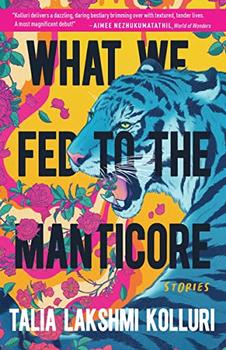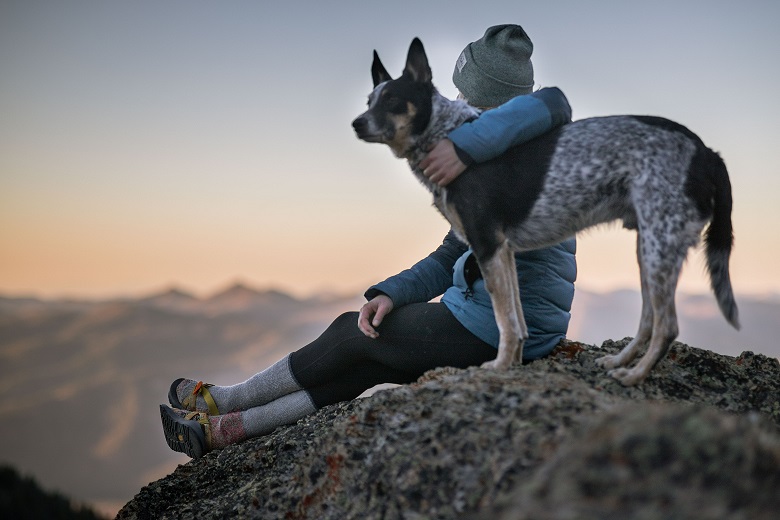Summary | Excerpt | Reviews | Beyond the Book | Read-Alikes | Genres & Themes | Author Bio

This article relates to What We Fed to the Manticore
 In What We Fed to the Manticore, Talia Lakshmi Kolluri uses short stories to explore humans' relationships with various animals, both wild and domestic. Through domestication, people have artificially selected for traits in animals or plants that are useful or appealing to them, creating species that are genetically distinct from their wild cousins. This process has played a key role in humanity's history; without the development of agriculture made possible by domestication, our modern society could not exist.
In What We Fed to the Manticore, Talia Lakshmi Kolluri uses short stories to explore humans' relationships with various animals, both wild and domestic. Through domestication, people have artificially selected for traits in animals or plants that are useful or appealing to them, creating species that are genetically distinct from their wild cousins. This process has played a key role in humanity's history; without the development of agriculture made possible by domestication, our modern society could not exist.
In her nine short stories, only one species is a repeat narrator—the dog. Dogs have certainly earned the nickname "man's best friend." Descended from wolves, many believe they were the very first animals to be domesticated, though scientists debate exactly when the process started and how long it took. Based on studies of genetics, it most likely began in northern Eurasia at some point up to 20,000 years ago. With the domestication of dogs beginning so long ago, it's uncertain exactly how it began. One theory is that it started with prehistoric table scraps. During the last ice age, hunters may have had more lean protein than they could safely eat—wolves may have discovered that staying near humans meant discarded food that made it easier to survive, starting themselves on the long journey to becoming dogs. The earliest dogs likely served multiple purposes, acting as guards, hunting companions and even a source of food. Over the millennia, selective breeding has allowed for diversification to fill a wide range of roles in human society, from vital rescue workers to beloved family pets and a whole host of jobs in between.
Many other animal species followed dogs in domestication, including staples of modern diets such as cows, pigs and chickens; fiber producers such as sheep, llamas and goats; and animals such as horses and donkeys who powered our world until the invention of modern engines. For millennia we have relied on domesticated animals for food, textiles and labor. Scientists believe that at the start of the process most of these animals were primarily used for their meat. Early sheep, for instance, would not have grown wool the way modern sheep do, and cows would have only produced enough milk to feed their own young. Selective breeding by humans has increased the milk production of cows, the number of eggs laid by chickens, and the amount of wool grown by sheep.
With so many species having been part of human societies since prehistory, it would be easy to think of domestication as something that is mostly over and done with. However, this way of thinking is inaccurate, as people continue to cultivate animals to address humanity's needs. For instance, fish farming has risen dramatically in recent decades. Studies of captive fish populations have reinforced the fact that domestication is a process, not a singular event. Different species of farmed fish are at very different points in the process, with only those that are bred in captivity being semi-domesticated. Without control over reproduction, farmers are unable to select for useful traits in the population, stopping domestication in its tracks. One example of this is eel farming. Attempts to breed eels in captivity so far have failed, so instead wild eels are captured at a young age and then raised until they are large enough to sell. This means that artificial selection is impossible, and domestication cannot even begin. While currently the vast majority of farmed fish cannot truly be called domesticated, this may change as the industry continues to develop.
As the stories in What We Fed to the Manticore demonstrate, humans remain a part of the natural world. It is true that we have had a profound effect on it, even to the extent of creating new types of animals and plants through domestication. However, we are equally dependent on nature, particularly the contributions of a myriad of non-human animals.
Filed under Nature and the Environment
![]() This article relates to What We Fed to the Manticore.
It first ran in the November 2, 2022
issue of BookBrowse Recommends.
This article relates to What We Fed to the Manticore.
It first ran in the November 2, 2022
issue of BookBrowse Recommends.
Show me the books he loves and I shall know the man...
Click Here to find out who said this, as well as discovering other famous literary quotes!
Your guide toexceptional books
BookBrowse seeks out and recommends the best in contemporary fiction and nonfiction—books that not only engage and entertain but also deepen our understanding of ourselves and the world around us.